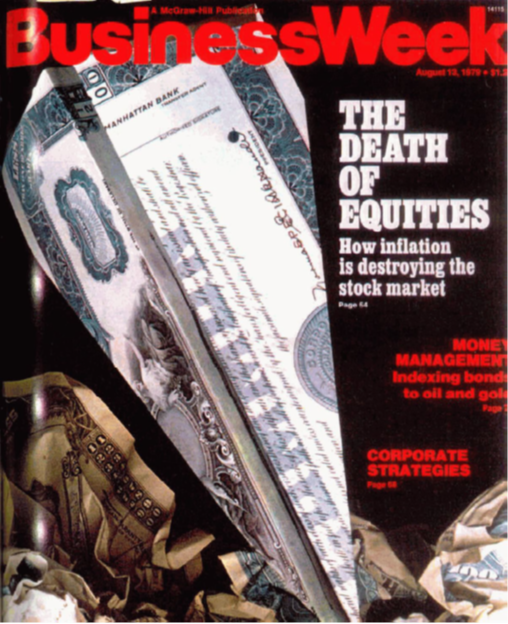The Death of Equities
I recently came across this BusinessWeek article, republished here by Barry Ritholtz, titled, “The Death of Equities.” On the original date of publishing, August 13th, 1979, the S&P 500 closed at 107.42 and to the magazine’s credit, it wasn’t until three years later that the index recorded its closing low of 102.4.
However, what the magazine got wrong was that equities did not in fact die. If you put $10,000 in the S&P 500 on the day the magazine was published, with dividends reinvested and taxes paid from other sources, your $10,000 would be worth more than $1,250,000 today and your average annual compound rate of total return has been 11.6%.
The article’s problem was that it assumed everything happening at that moment was permanent. All the difficulties being faced would never be solved. Interest rates and inflation would be forever high. The investment trends of the minute would persist for generations. The world was dark, and the sun would never shine again.
The seems obviously incorrect in retrospect but I constantly talk to people today that feel the same way about the future.
“[Pick a political party] has ruined the country.”
“[Name a city] is going to hell and will never recover.”
“Kids these days are lazy and don’t want to work.”
Humans want to believe that whatever they are experiencing in the moment is the new norm. When things feel bad, they sell stocks like they are going to be bad forever. When things feel good, euphoria sets in and stocks trade like they will never come back down. Moderation and change seem almost impossible. So, if you are feeling good about the markets, don’t get too excited and if you are feeling bad, don’t get too depressed. Tune out the noise, execute on your long-term plan, limit the impact emotion has on your portfolio, and remember that the death of equities is often greatly exaggerated.




When it comes to writing about investments, the disclaimers are important. Past performance is not indicative of future returns, my opinions are not necessarily those of TSA Wealth Management and this is not intended to be personalized legal, accounting, or tax advice etc.
For additional disclaimers associated with TSA Wealth Management please visit https://tsawm.com/disclosure or find TSA Wealth Management's Form CRS at https://adviserinfo.sec.gov/firm/summary/323123